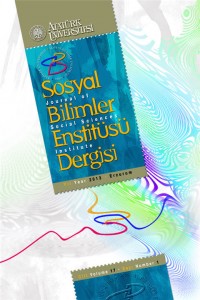William Faulkner’in “Ayı” adlı Öyküsüne Ekoeleştirel Yaklaşım / Ecocritical Approach to “The Bear” by William Faulkner
Abstract
References
- Aytür, N. (1968). “William Faulkner’ın Eserlerinde İnsanın Tabiatla İlişkileri”. Ankara Üniversitesi Batı Dil ve Araştırmaları Dergisi, 3(1), 103-127.
- Bookchin, M. (1996). Ekolojik Bir Topluma Doğru. (A. Yılmaz, çev.). İstanbul: Ayrıntı. Faulkner, W. (1991). Ayı. (M. Belge, çev.). İstanbul: İletişim.
- Fromm, H. (1996). “From Transcendence to Obsolescence”. C. Glotfelty-H. Fromm (Eds.). The Ecocriticism Reader: Landmarks in Literary Ecology içinde (p. 30-39). Athens, Georgia: The University of Georgia Press.
- Glotfelty, C. (1996). “Introduction: Literary Studies in an Age of Environmental Crisis”. C. Glotfelty-H. Fromm (Eds.). The Ecocriticism Reader:Landmarks in Literary Ecology içinde (s. xv-xxxvii). Athens, Georgia: The University of Georgia Press.
- Halman, T.S. (1963). William Faulkner: Hayatı Sanatı Eserleri. İstanbul: Varlık
- Jardins, (2006). Çevre Etiği: Çevre Felsefesine Giriş. (R. Keleş. çev.). İstanbul: İmge.
- Love, G. (2003). Practical Ecocriticism. Charlottesville and London:University of Virginia Press.
- Roszak, B., Roszak, T. (2000). “Deep Form in Art and Nature”. L. Coupe (Ed.). The Green Studies Reader: From Romanticisim to Ecocriticism içinde. (s. 223226). Florance, KY, USA: Routledge.
- Stein, R. (2000). “To Make the Visible World Your Conscience:Adrienne Rich as Revolutionary Nature Writer”. J. Tallmadge-H. Harrington (Eds.). In Reading Under the Sign of Nature:New Essays in Ecocriticism (p. 198207). Salt Lake City: The University of Utah Press.
- Ünder, H. (1996). Çevre Felsefesi: Etik ve Metafizik Görüşler. Ankara: Doruk.
- White, L. (1996). “The Historical Roots of Our Ecological Crisis”. C. Glotfelty-H. Fromm (Eds.). In The Ecocriticism Reader:Landmarks in Literary Ecology (p. 314). Athens, Georgia: The University of Georgia Press.
- Yamazato, K. (2003). “Kitkitdizze, Zendo, and Place: Gary Snyder as a Reinhabitory Poet”. M. P. Branch-S. Slovic (Eds.). In The Isle Reader: Ecocriticism,19932003, (p. 10-21). Athens, Georgia: The University of Georgia Press.
Abstract
This study aims to analyze William Faulkner’s story “The Bear” by making use of ecocritical approach. While it is applied to a literary work, ecocritical approach adopts an earth centered attitude rather than a human centered one. Therefore nature-human connections and interactions, found in the story, are attempted to be analyzed with an earth centered perspective. Faulkner’s work leads the contemporary human to question universal values for ecological and environmental problems that are felt more deeply and effectively today, and their probable solutions. In this regard, human-nature connections and interactions, Faulkner handled in the story, have not been limited to the place and the period that the work involves. While Faulkner handles ecological and environmental problems, by emphasizing the root causes of these problems, he orients people to execute solutions on the basis of these causes. Religion, money-based economy that developed and shaped under the influence of man centered view is influential in damaging the nature. People are cursed after damaging the nature. In order to avoid this curse, they should learn how to live in harmony with nature as in times it was not damaged. In order to achieve this, people should revise their universal values. While revising these values, people should realize the ecological and environmental problems they created and then change the physical and metaphysical codes they have created toward the nature. Otherwise it will be hardly possible to avoid this curse. The incidents as a result of HES projects exemplify this situation very well. These examples indicate that we have not changed our negative attitudes toward nature. If human can attain his values of judgments, he can have a chance to avoid this curse.
References
- Aytür, N. (1968). “William Faulkner’ın Eserlerinde İnsanın Tabiatla İlişkileri”. Ankara Üniversitesi Batı Dil ve Araştırmaları Dergisi, 3(1), 103-127.
- Bookchin, M. (1996). Ekolojik Bir Topluma Doğru. (A. Yılmaz, çev.). İstanbul: Ayrıntı. Faulkner, W. (1991). Ayı. (M. Belge, çev.). İstanbul: İletişim.
- Fromm, H. (1996). “From Transcendence to Obsolescence”. C. Glotfelty-H. Fromm (Eds.). The Ecocriticism Reader: Landmarks in Literary Ecology içinde (p. 30-39). Athens, Georgia: The University of Georgia Press.
- Glotfelty, C. (1996). “Introduction: Literary Studies in an Age of Environmental Crisis”. C. Glotfelty-H. Fromm (Eds.). The Ecocriticism Reader:Landmarks in Literary Ecology içinde (s. xv-xxxvii). Athens, Georgia: The University of Georgia Press.
- Halman, T.S. (1963). William Faulkner: Hayatı Sanatı Eserleri. İstanbul: Varlık
- Jardins, (2006). Çevre Etiği: Çevre Felsefesine Giriş. (R. Keleş. çev.). İstanbul: İmge.
- Love, G. (2003). Practical Ecocriticism. Charlottesville and London:University of Virginia Press.
- Roszak, B., Roszak, T. (2000). “Deep Form in Art and Nature”. L. Coupe (Ed.). The Green Studies Reader: From Romanticisim to Ecocriticism içinde. (s. 223226). Florance, KY, USA: Routledge.
- Stein, R. (2000). “To Make the Visible World Your Conscience:Adrienne Rich as Revolutionary Nature Writer”. J. Tallmadge-H. Harrington (Eds.). In Reading Under the Sign of Nature:New Essays in Ecocriticism (p. 198207). Salt Lake City: The University of Utah Press.
- Ünder, H. (1996). Çevre Felsefesi: Etik ve Metafizik Görüşler. Ankara: Doruk.
- White, L. (1996). “The Historical Roots of Our Ecological Crisis”. C. Glotfelty-H. Fromm (Eds.). In The Ecocriticism Reader:Landmarks in Literary Ecology (p. 314). Athens, Georgia: The University of Georgia Press.
- Yamazato, K. (2003). “Kitkitdizze, Zendo, and Place: Gary Snyder as a Reinhabitory Poet”. M. P. Branch-S. Slovic (Eds.). In The Isle Reader: Ecocriticism,19932003, (p. 10-21). Athens, Georgia: The University of Georgia Press.
Details
| Primary Language | tr;en |
|---|---|
| Journal Section | Makaleler |
| Authors | |
| Publication Date | June 18, 2013 |
| Published in Issue | Year 2013 Volume: 17 Issue: 1 |



